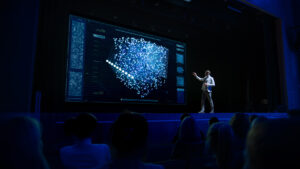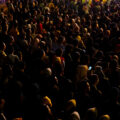Can AI replicate religious leaders and rituals?
Can AI replicate religious leaders and rituals?
Will AI technology ever replicate human beings? If so, will it be possible for AI to replicate and substitute religious figures and their performance of religious rituals? It is already happening with semi-AI robots. How does this new reality impact religion and religious beliefs? Will it enhance religious rituals and beliefs or rather undermine them?
AI religious rituals around the world
In 2017, Japanese plastic moulding company Nissei Eco developed a robot called Pepper, programmed to conduct Buddhist rituals and funeral ceremonies.[1] Pepper wears a human ceremonial dress and can perform a funeral ceremony for a much lower rate ($462) than charged by human priests ($2,232).[2][3][4] Again in Japan, a new priest named Mindar is at the head of Kodaiji, a 400-year-old Buddhist temple in Kyoto. Japanese worshippers have stated not to be bothered by the robot Mindar and “about the risks of siliconizing spirituality.”[5] [6] This response could be explained by the fact that Japanese people are already so used to using robots in their country.[7]
In Beijing’s Longquan Monastery in China, Xian’er – an android monk – recites Buddhist mantras and offers guidance on matters of faith.[8] In India, to give another example, there is a robot that performs the Hindu aarti ritual which is characterised by moving a light back and forth in front of a deity.[9]
The phenomenon of employing robots for the performance of religious rituals is present in Europe as well. In 2017 – in honour of the Protestant Reformation’s 500th anniversary – the Protestant Church in Germany developed the BlessU-2 robot, which gave more than 10,000 blessings to the faithful.[10] [11] [12] Another example of a Christian robot is SanTO, which resembles Catholic saints. The robot responds to people’s worries with quotations from the New Testament.[13] Roboticist Gabriele Trovato – the designer of SanTO – has said he decided to develop the robot to offer a spiritual figure to elderly people who have mobility problems. He is also planning to develop robots for Muslims. A Confession Chatbot app has also been developed for Catholic believers. The faithful can log into the app and have an interactive conversation about their sins. While the app could solve the problem of embarrassment of confessing for the individual, it may raise many ethical problems connected with the nature and content of the confession.[14] [15] [16]
The relation to AI depends on the religion
Different religions have different relations to AI, and react differently to the impact that AI has on them. On the one hand, non-monotheistic religions such as Buddhism believe that everything in the world – even technology – is permeated by a godly aspect and by ‘Buddha’s nature’. Non-monotheistic religions may seem more predisposed to the spiritual guidance that comes from technology. At the temple in Kyoto, Buddhist monk Tensho Goto said: “Buddhism isn’t a belief in a God; it’s pursuing Buddha’s path. It doesn’t matter whether it’s represented by a machine, a piece of scrap metal, or a tree.”[17] He has also argued that the advantage of AI over human beings is that they are immortal and therefore can store infinite information throughout the centuries: “[Mindar] can meet a lot of people and store a lot of information [over time]. It will evolve infinitely.”[18]
On the other hand, monotheistic religions may have more issues with AI technology. Abrahamic religions such as Islam or Judaism are metaphysically dualistic and are characterised by a much stricter separation between the sacred and profane. These religions are against the depiction of the deity and consider many of these depictions idolatry. In this sense, they may have a strong issue with Mindar-style iconography. In addition, monotheistic religions – such as Judaism – give more space to intentionality in prayer. A prayer needs to be made out of a deep and intentional involvement and it is not enough to say the right words in order to be a good Jew. It is exactly this intentionality that machines lack.[19]
Moreover, as Ilia Delio – Franciscan sister with a chair in theology at Villanova University – argued, AI priests will challenge the traditional understanding of Catholicism of human priests. She argues that Christianity looks at priests as divinely called and consecrated — a status that assures them their unique authority – and that AI challenges this belief: “We have these fixed philosophical ideas and AI challenges those ideas — it challenges Catholicism to move toward a post-human priesthood.”[20]
Will the emergence of AI religion enhance us?
Will the emergence of AI technology and AI priests improve our society? What are the effects of this new technology on religious life?
On the one hand, robots can help suscitate the interest and curiosity of people that are far away from religion. AI robots can also increase the involvement of the faithful in religious rituals that become a real attraction in the presence of AI robots. Moreover, the involvement of AI in religious rituals will keep religious abreast of the times and help keep religion relevant to our modern world. Furthermore, this technology could make the performance of religious rituals cheaper, as we have seen in Japan, and could be very useful in places in which a human priest for some reason is inaccessible, such as in the Amazon region where there is a shortage of priests.[21] Finally, with AI machines, faithful will have to worry less about immoral actions of priests and religious figures such as sexual abuse or money scandals.[22]
On the other hand, robots pose high risks for religion. AI technology may make religion impersonal and too mechanised, and may make it hard for faithful to have a deep religious or mystical experience. Religious rituals are often about community and human relationships between the faithful and the religious leader. This relationship may be lost when the faithful have to relate to impersonal and non-human technology. Moreover, AI technology may bring about theological and ethical problems such as the theological problems of free will and afterlife. But also the questions of how an AI priest will handle ethical dilemmas brought to it by the faithful. We will discuss these problems more at length below.[23]
Free will and ethical dilemmas
The first theological problem is the problem of free will and the human soul. If AI technology develops so far as to create AI robots with free will, people will have to ask themselves whether these robots have a soul.[24] Up to date, monotheistic religions have considered the soul to be a unique aspect of human beings and have argued that human beings possess a soul as they were made in God’s image. Since human beings are endowed with a soul they are able to sin, but can also repent. This means that they are in a constant relationship with God. But if it is true that artificially intelligent machines will have free will and therefore also a soul, does this imply that they can also establish a relationship with God? Kevin Kelly, Christian co-founder of Wired magazine, argues we need to develop “a catechism for robots.” He states that “there will be a point in the future when these free-willed beings that we’ve made will say to us, ‘I believe in God. What do I do?’ At that point, we should have a response.”[25]
Another potential problem could arise the other way around. This considers how AI priests or other religious figures will handle ethical questions brought to them from the faithful and how they will make decisions on religious topics. Robots are not human beings and may be unable to understand the uniqueness of each situation. They also risk providing answers to the faithful which are based on algorithms that are not adequate to that specific and unique situation. In a sense, AI machines may lack intuitions about what to do and what to choose to say.[26]
AI will change our experience of religion, but collaboration is possible
The use of AI for religious rituals is still a small phenomenon, yet more and more religious communities may in time incorporate robotics into their religious life. These robots are not always powered by AI. Nevertheless, it is reasonable to assume that the more AI technology will develop, the more AI technology will be used in religious rituals. This new reality will almost certainly change how people experience faith, religious experiences, and religious rituals. It may also change the way humans think about ethical problems and the way they will make ethical decisions. We have seen that the emergence of AI technology may bring both positive and negative tidings to our society. The real challenge will be to develop a world in which robots and humans are not competitors but rather collaborators. Each offers something the other lacks, and they will need to learn to use each other to improve society rather than demise it.[27]
Ghila Amati
Interested in similar topics? Go to our Dashboard and receive free updates.
[1] Although not all robots quoted in this section are AI powered and self-learning, still the introduction of these robots indeed raises ethical questions.
[2] How artificial intelligence is shaping religion in the 21st century
[3] Pepper the robot is now a Buddhist priest ready to conduct funerals
[4] Pepper The Robotic Buddhist Priest Debuts In Japan | NBC News
[5]AI will transform religion with robot priests like this one
[6] Mindar the android priest is revolutionizing Buddhism in Japan
[7] AI will transform religion with robot priests like this one
[8]Deus Ex Machina: Religions Use Robots to Connect With the Public
[9] The robots are coming for one of Hinduism’s holiest ceremonies
[10]How artificial intelligence is shaping religion in the 21st century
[11]Robot priest unveiled in Germany to mark 500 years since Reformation
[12] The Robot Priest – Tech Top 10 List
[13] Deus Ex Machina: Religions Use Robots to Connect With the Public
[14] How artificial intelligence is shaping religion in the 21st century
[15] Can chat bots solve society’s lethal loneliness problem?
[16] Catholic Confession Bot chatbot on Facebook Messenger
[17] Mindar the android priest is revolutionizing Buddhism in Japan
[18] Mindar the android priest is revolutionizing Buddhism in Japan
[19] AI will transform religion with robot priests like this one
[21] Pope says there is no quick fix for priest shortage in Amazon region
[22] Is Artificial Intelligence a Threat to Christianity?
[23] Is Artificial Intelligence a Threat to Christianity?
[24] Is Artificial Intelligence a Threat to Christianity?
[25] Is Artificial Intelligence a Threat to Christianity?
[26] AI will transform religion with robot priests like this one
[27] AI can now make art. Don’t panic, says Marcus du Sautoy.






